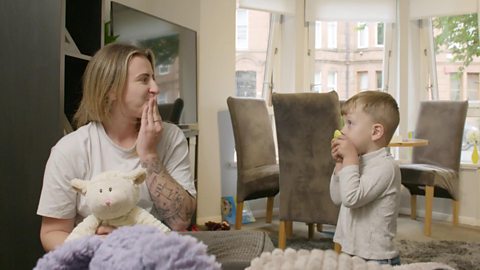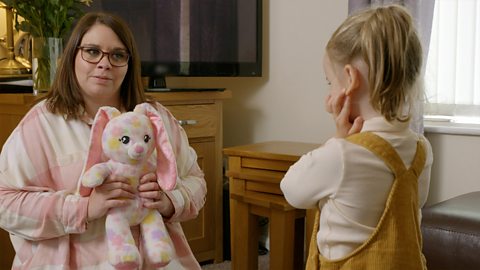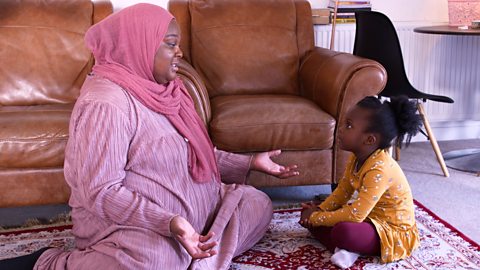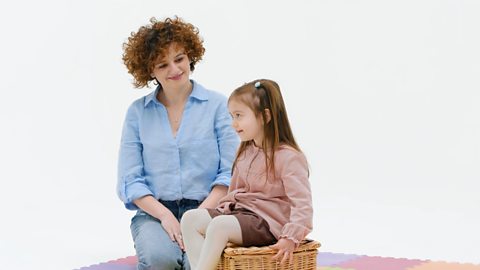Home > Activities > 3-4 years
Using toys can be a good way to combine your childãs love of pretend play with their language development.
Planning and going on an adventure together will help them think beyond the present and start forming more complex sentences.
Join these families as they discover why planning adventures are great for language developmentãÎand brilliant fun too!
We're going to take teddy on an adventure. Where's teddy going to go?
Taking him to the forest.
Oh, you're going to take him to the forest?
Yeah.
Erik, what adventures do you think teddy would like to go on tomorrow?
In the cave.
You think teddy wants to go
in the cave tomorrow?
Yeah.
And what shall we play in the cave?
Monsters pretend.
Pretending to be monsters?
Yeah.
Will you be there? You want me to come too?
Yeah.
Okay, I'll come as well. What might you see in the forest?
Fairy houses.
Fairy houses? What colour are they?
I'll see like aãÎa dark purple and a light pink.
Oh, will you?
Yeah.
What about if you knock on the door? Will someone answer?
The teddy doesn't even have any fingers.
Oh, he doesn't have fingers.
No.
Okay. You'll have to help him. Yeah.
Yeah.
Where else shall we take teddy next week, Erik?
To the sheep up there.
To see the sheep on the farm?
Yeah.
Do you think teddy will like that?
Yeah.
I think I can see something! Oh! There's a fairy house.
Oh, yeah!
Show teddy. Teddy, look at the fairy house.
Teddy, look at the fairy house.
It has gems on it.
Gems on it.
Yeah.
Oh, there's a fairy house there.
Oh, another one up there.
Another one.
I think I can see something on therewith ears sticking up.
Can you see it?
°ÜÝÞý¿°µãÎ
What is it?
It's a bunny!
That's right, yeah. Oh, wow!
What are the language benefits of this activity?
- Planning together helps build your childãs vocabulary and helps your child talk in the future tense.
- Using what, where and why questions encourages them to construct longer and more complex sentences.
- Letting your child take the lead builds their confidence and encourages them to think of words and sentences for themselves.
- Playing this game helps them to think beyond the present moment. This is a great opportunity for learning to sequence and plan language.
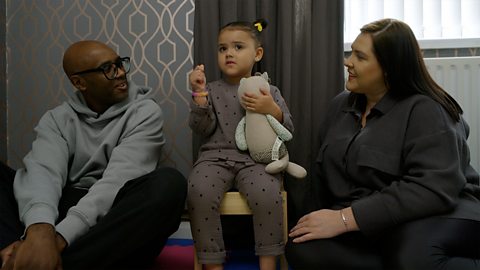
How to get the most out of this activity
Use what, where and why questions to plan an adventure that they can go on with a favourite toy.
Encourage them to think about where they would like to go and whether teddy would enjoy it too.
Try to get your child to give as much detail as possible. Ask them about things they might see, hear or smell on their adventure.
It's alright if they makes some mistakes when using different tenses, this is completely normal.
Just repeat their sentence back to them correctly and they'll soon get the hang of it.
Planning adventures and having fun through pretend play can be a fun activity for the whole family.

Help your child with new tenses and sentence structures
- What is decontextualising? And why is it important for your child to practise it?
- This fun activity can also help your child talk about the future.
- Has your child learned to time travel yet? This short video explains everything you need to know.
- Check out these top tips from Dr Clare Halsey on improving your child's memory and encouraging them to think outside of the present moment.

